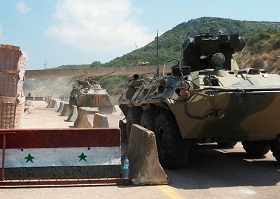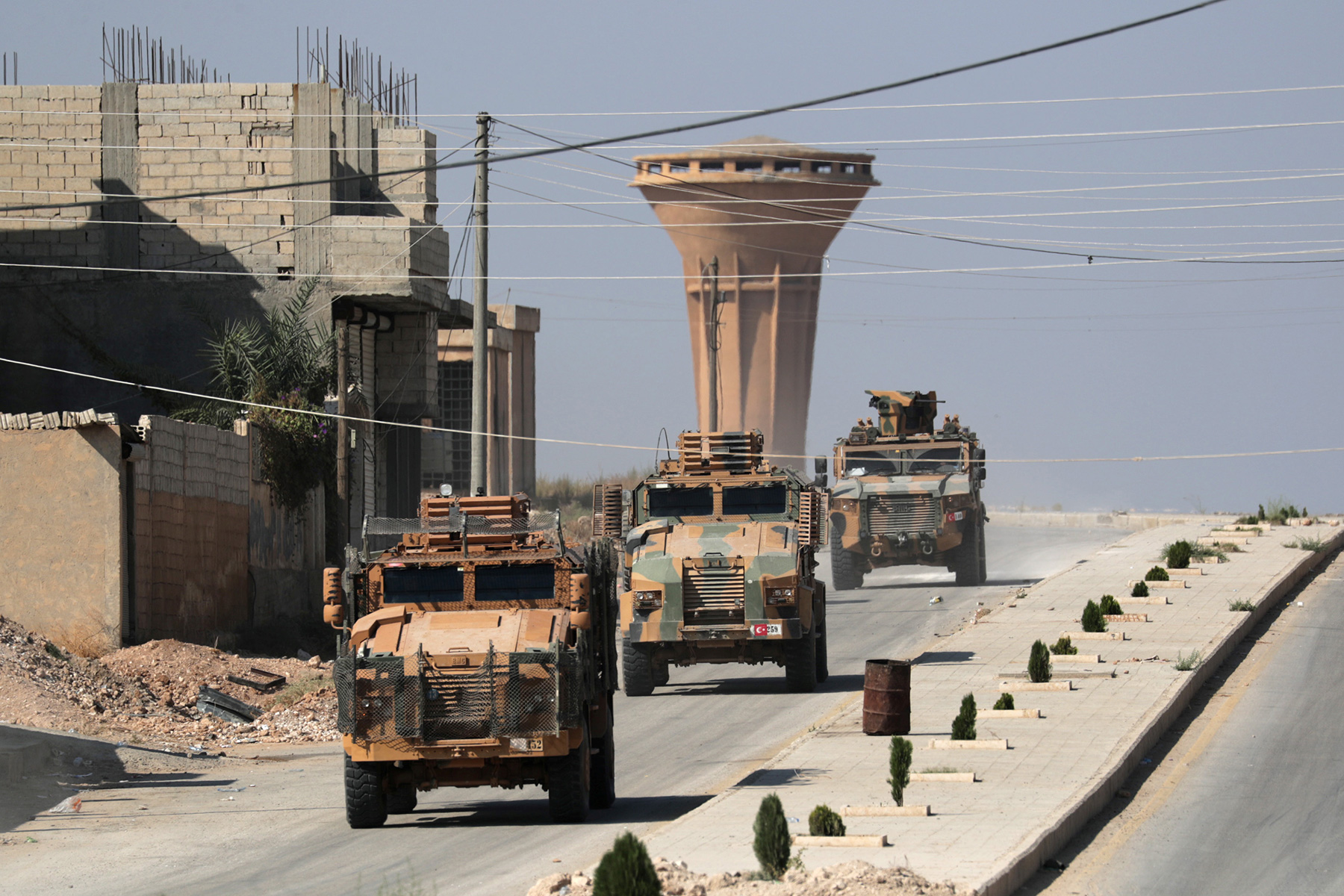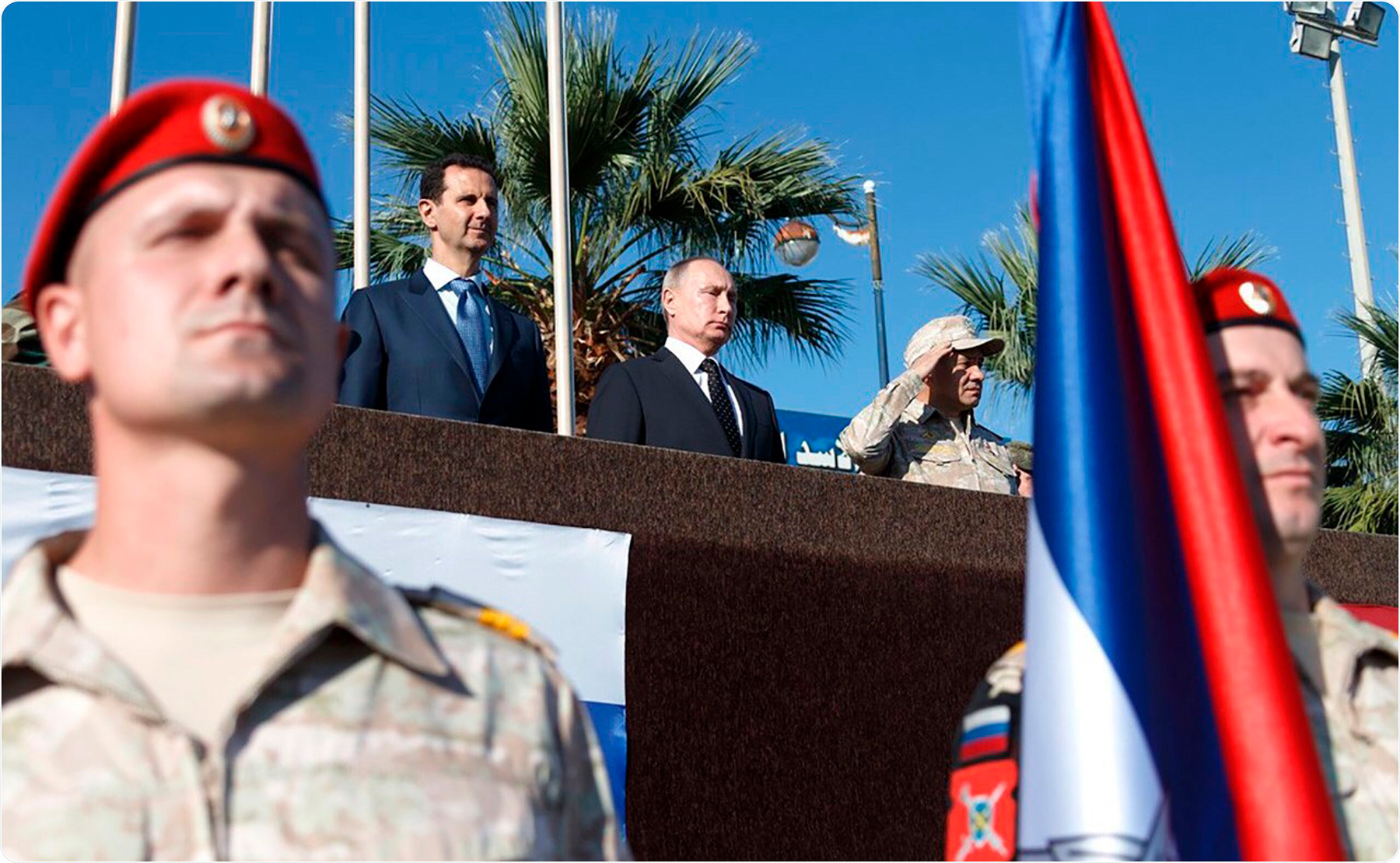Russia’s main concerns about the CBM and its prolongation revolve around six main arguments.
1. There is next to none projects of early recovery and post-conflict reconstruction freed from political demands.
2. A lack of progress in organizing systematic cross-line deliveries.
3. Hayat Tahrir al-Sham (HTS), an internationally recognized terrorist organization, is still in control of Idlib. It usurps authority, manipulating humanitarian aid that flows into the province.
4. The U.S. and the EU have imposed unilateral sanctions on Syria, which significantly hinders humanitarian aid deliveries, early recovery and post-conflict reconstruction.
5. The U.S. illegal military presence in northeastern Syria and the U.S. General License 22 preclude an effective restoration of economic ties in Syria as well as the country’s territorial integrity and sovereignty.
6. The UN remote monitoring mechanism is uncapable of tracking the distribution of humanitarian aid inside the province of Idlib.
An extension of the CBM is seen by Moscow as a bargaining chip, and Moscow will try to get something in exchange for a CBM prolongation. What can it potentially be?
- On Apr. 23 2022, Turkey closed its sky for Russia’s military and civilian aircraft heading for Syria. It did not seriously affect Moscow’s ability to deliver staff and equipment to Syria but Russia might seek to get things back to normal;
- Moscow might seek the U.S. to turn a blind eye on Damascus re-establishing economic and business ties with the northeastern Syria exempted from the U.S. sanctions;
- Russia is always pushing for the lift of unilateral sanctions on Syria;
- Moscow might be interested in establishing a similar mechanism for Ukraine – delivering UN humanitarian aid to eastern Ukraine from Russia. Given the humanitarian needs there, Russia may be open to such an “exchange of CBMs”.
That said, neither Russia nor its opponents will realistically benefit from vetoing an extension of UNSC res. 2585. If the West decides to go along with an alternative way to deliver humanitarian aid cross-border, thereby bypassing the UN authorization, it will take quite a time to make it, causing further difficulties during the implementation. Moscow will lose its leverage while humanitarian aid will continue to flow to Idlib, if on a lower scale, via different mechanisms. Therefore, both parties should be interested in striking a compromise.
Humanitarian crisis in Syria is among the most severe in the world, and there is little hope that the situation will improve given that the economic situation in the country was deteriorating over the past year. In addition to that, intensifying confrontation between Russia and the West, escalating situation in Ukraine, high oil prices and persisting global consequences of the COVID-19 pandemic present even more complicated conditions for improving the humanitarian situation in conflict zones throughout the globe, including that in Syria.
So far, the UNSC failed to pass the resolution that would extend the cross-border mechanism (CBM) of humanitarian aid delivery to Syria since the UNSC res. 2585, which was adopted a year ago on July 9, 2021, expired on July 10, 2020. Traditionally, Russia and its Western counterparts struggle to reach a compromise to suffice all stakeholders. However, despite the opposition among the permanent members of the UNSC, they have eventually been managing to come to a mutually acceptable text. In 2022, the situation has further been complicated by the growing Russia–West rift and shrinking dialog on all levels, which has not so far resulted in a compromise resolution on the CBM in Syria. Although on July 8 neither Western nor Russian draft of the resolution have been voted on, there is still a small chance that a compromise might be found.
Some context
The cross-border mechanism was established back in 2014 by UNSC resolution 2165 as a temporary measure to increase humanitarian outreach in Syria when Damascus failed to properly address humanitarian challenges, with the country gradually swallowed by radical armed groups, including ISIS and al-Qaeda affiliates. Originally, there were four border-crossings: al-Yarubiyah, al-Ramtha, Bab al-Hawa and Bab al-Salam. Since July 2020, there is only one official border-crossing remaining—Bab al-Hawa—which can be used by the UN and affiliated humanitarians to deliver aid to about 4 million people in need in areas controlled by armed groups (including terrorist HTS) and Turkish Armed Forces and their affiliates in the north-west and northern Syria.
Over the past years, Russia opposes the extension of the CBM, trying to make the UN and other INGOs foster their engagement with Damascus on humanitarian aid deliveries within the country across the lines. Oppositely, its opponents (including the EU and the U.S.) are insisting on the CBM to be preserved, and they are even re-opening other border-crossings unwilling to work with the Syrian government, arguing that cross-line can in no way replace the cross-border. Moscow justifies its approach by the changed reality on the ground which requires closer and increased engagement with the Syrian government. Core of these changes are:
Damascus now controls about 65% of the country;
More than half (some 65%, or 14 million people, as the UN suggests) of the population resides on government-controlled areas;
The majority of people in need (about 8.1 million or 55% of the population, according to the UN) still reside in areas controlled by the Syrian government.
As a result, Moscow argues that the UN and INGOs have to engage more with the Syrian government and work within the country. Moscow believes that the CBM is now used at the expense of the cross-line.
On May 20, 2022, during a session of the UNSC, Dmitry Polyansky, Russia’s deputy permanent representative to the UN, stressed that implementation of the UNSC res. 2585 (2021) was stalling and that Russia saw no ground to prolong the CBM in its current form.
Situation with cross-border and cross-line aid deliveries
Although Russia welcomes all five cross-line humanitarian convoys to Idlib, which happened since July 2021, it remains skeptical and concerned about the progress on implementation of UNSC res. 2585, which envisaged an increase in cross-line deliveries of aid and more early recovery projects. Commenting on the recent UN Secretary-General report to the UNSC on humanitarian aid deliveries to Syria, Alexander Lavrentiev, Russia’s envoy to Syria, underlined that the UN has not done enough to meet the plan envisaged by the resolution 2585. This is why Russia sees no point in adopting a resolution no different from that of the year before.
In his report, Antonio Guterres highlighted the obvious progress with cross-line aid deliveries to the northwest of Syria, stressing at the same time that it was not enough to replace the Bab al-Hawa crossing. Such statements are perceived in Moscow with much apprehension. Since the adoption of the resolution in July 2021, only five humanitarian convoys of 70 trucks (as of June 16) went to Idlib de-escalation zone via cross-line, while 6,804 trucks went to Idlib via Bab al-Hawa border crossing since June 2021 [1] . Even if we compare this with cross-line deliveries to north-east Syria, where “the UN and humanitarian partners maintained regular and sustained humanitarian access” (according to the report), they are heavily exceeded by the deliveries through Bab al-Hawa: 1,746 trucks in 10 months of 2021 (January-October) to north-east Syria versus 2,386 trucks in 5 months (July-November) to northwest Syria. Apparently, cross-line aid deliveries do not meet cross-border by volume and frequency, and the situation has remained unchanged since the adoption of the UNSC res. 2585 on July 9, 2021. In this context, Russia cannot agree with the comments on “the obvious progress” in cross-line aid deliveries, when the situation has hardly improved.
Russia’s main concerns about CBM and prolongation of UNSC res. 2585
To wrap up all mentioned above, Russia’s main concerns about the CBM and its prolongation revolve around six main arguments.
1. There is next to none projects of early recovery and post-conflict reconstruction freed from political demands. D. Polyansky underlined this, suggesting that the West must cease its attempts to link obligations under UNSC res. 2585 to political preconditions. He also mentioned increasing violations of res. 2585 and called on the parties to stop imposing political conditions on international reconstruction efforts in Syria. Russia is concerned with the way the UN does assessment of the needs and allocates funds. It urges to focus on those who need new housing, who need to send their kids to school, to hospitals, and those who must obtain access to tap water. So far, according to the Russian diplomats, the UN has done extremely little on this track, which is why Moscow urges donors to re-consider their approaches to humanitarian assistance in Syria. Besides, it is important to underline that Russia publicly welcomed the decision of the U.S. Office of Foreign Assets Control (OFAC) to amend NGO General License to expand exemptions for NGOs seeking to improve humanitarian access and early recovery activities in Syria. It happened on Dec. 20, 2021 during the UNSC session on Syria.
2. A lack of progress in organizing systematic cross-line deliveries. Only five cross-line convoys in one year. Russia believes there are no big obstacles to organize cross-line convoys if the UN and its Western donors had a genuine will. A major concern harbored by the EU/the U.S. is that a CBM closure will leave 4 million Syrians in northwestern and northern Syria residing with no access to humanitarian aid. Moscow’s key concern is that humanitarian aid must flow more through Damascus as well as to the areas controlled by the Syrian government, as they host more people in need (8.1 million out of 14.6 million).
3. Hayat Tahrir al-Sham (HTS), an internationally recognized terrorist organization, is still in control of Idlib. It has usurped authority, manipulating humanitarian aid that flows into the province. Russia blames the co-sponsors of res. 2585 for accepting the status quo in northwestern Syria.
4. The U.S. and the EU have imposed unilateral sanctions on Syria, which significantly hinders humanitarian aid deliveries, early recovery and post-conflict reconstruction.
5. The U.S. illegal military presence in northeastern Syria and the U.S. General License 22 (issued on May 12, 2022) exempting northeastern and northwestern areas, which are not under the government control, from U.S. sanctions – all of this precludes an effective restoration of economic ties in Syria as well as the country’s territorial integrity and sovereignty.
6. The UN remote monitoring mechanism is uncapable of tracking the distribution of humanitarian aid inside the province of Idlib. According to Dmitry Polyanskiy, Moscow has no doubts that the UN monitoring mission has control over the shipping of humanitarian convoys until the border with Syria. However, Russia’s main concern is about Idlib, “which is filled with HTS terrorists who largely dominate and control all spheres of civilian life.” The main question Moscow asks is how the UN can ensure an unbiased and independent distribution of aid in such conditions. According to Polyanskiy, it is exactly because of the militants that the aid delivered via cross-line from Aleppo to Sarmada in August 2021 was first distributed only on December 16. This is why the assertions about the UN having an effective remote-control monitoring mechanism in Idlib are absolutely tenuous in Moscow’s eyes.
Looking into the future
Considering a huge lack of trust between Russia and the West, a special verification mechanism can be established to ensure the implementation of obligations taken by the parties. For example, if Russia agrees to renew the CBM as the EU/the U.S. agree to boost UN aid flow through Damascus, the parties can verify whether all obligations are met on a quarterly basis. If the EU fails to increase its humanitarian aid flow via Damascus, Moscow will have the right to revoke its decision to prolong the CBM to Idlib or not to prolong it for the next period. Such verification mechanism could motivate both sides to deliver aid, helping them to build the initial level of trust.
Together with that, there is another important mutual concern, which is the absence of transparent monitoring mechanism of aid delivery. Neither the EU/the U.S. nor Russia/Damascus trust that the aid coming through their channels ends up in the right hands. For this matter, the parties could consider setting up a new joint monitoring mechanism which could verify transparency of UN humanitarian aid delivery.
What could be behind the bargain?
An extension of the CBM is seen by Moscow as a bargaining chip, which can serve its goals. Last year, it appeared that Russia and the U.S. struck a deal envisaging a resumption of the Arab gas pipeline as well as gas and electricity deliveries to Lebanon via Syria. It benefits Damascus and it is seen as a concession on the part of the U.S. By the same token, Moscow will try to get something in exchange for a CBM prolongation, although this looks less likely in the current circumstances. What can it potentially be?
- On Apr. 23 2022, Turkey closed its sky for Russia’s military and civilian aircraft heading for Syria. It did not seriously affect Moscow’s ability to deliver staff and equipment to Syria but Russia might seek to get things back to normal;
- Moscow might seek the U.S. to turn a blind eye on Damascus re-establishing economic and business ties with the northeastern Syria exempted from the U.S. sanctions;
- Russia is always pushing for the lift of unilateral sanctions on Syria;
- Moscow might be interested in establishing a similar mechanism for Ukraine – delivering UN humanitarian aid to eastern Ukraine from Russia. Given the humanitarian needs there, Russia may be open to such an “exchange of CBMs”.
That said, neither Russia nor its opponents will realistically benefit from vetoing an extension of UNSC res. 2585. If the West decides to go along with an alternative way to deliver humanitarian aid cross-border, thereby bypassing the UN authorization, it will take quite a time to make it, causing further difficulties during the implementation. Moscow will lose its leverage while humanitarian aid will continue to flow to Idlib, if on a lower scale, via different mechanisms. Therefore, both parties should be interested in striking a compromise.
On July 8, neither draft of a new resolution passed a vote, with the core difference between the two being the mechanism that prolongs the CBM. The Western draft insisted on a mechanism identical to that of the res. 2585 with an automatic prolongation of the resolution for additional six months once the first six months are over. Alternatively, the Russian text suggested a prolongation of the CBM for six months only, requiring a new UNSC resolution to prolong it for another six months in January 2023 until July 2023. Russia’s unwillingness to vote for almost the same resolution as last year could be explained by the fact that little has actually been implemented since last July. Therefore, Moscow wants to modify the resolution in a way to boost its implementation on the most important issues: establishing of stable, working and increasing cross-line aid deliveries together with more early recovery projects. In other words, Russia wants to see real progress in implementation of the resolution.
Previous experience demonstrates that compromise could always be reached but the current global environment and a lack of implementation of the res. 2585 makes Russia less flexible. At the same time, Moscow leaves the door open, suggesting that it is ready to discuss its draft of the resolution if it is going to be put on the table again.
1. Data is taken from the UN General Secretary’s reports to the UNSC: 14 convoys (1476 trucks) in June-July 2021, 13 convoys (470 trucks) in Aug-Sept, and 21 convoys (1,900 trucks) in Oct-Nov. 2021, 13 convoys of 1,272 trucks in Feb.-March 2022, and 20 convoys of 1,686 trucks in April-May 2022.







